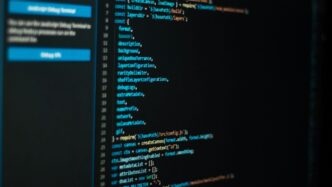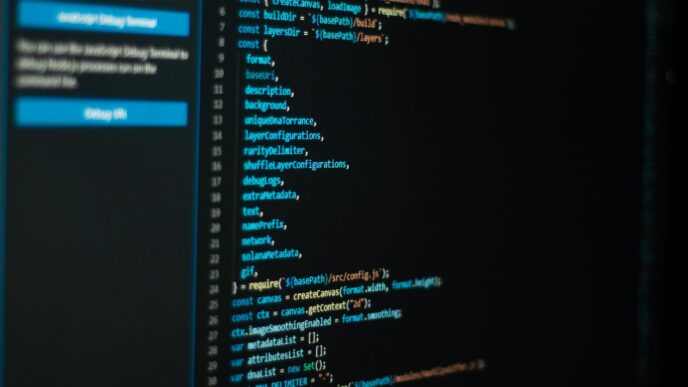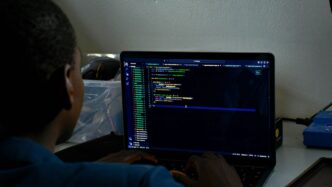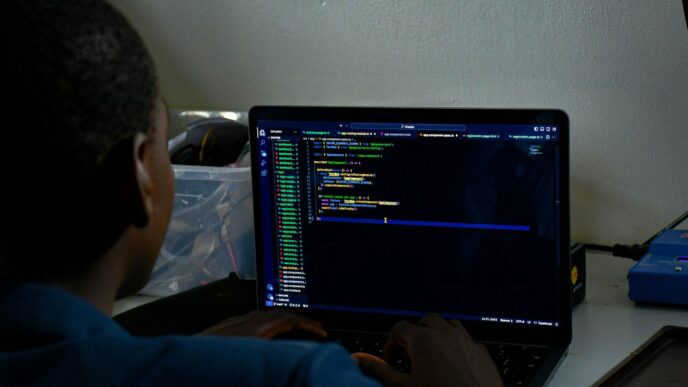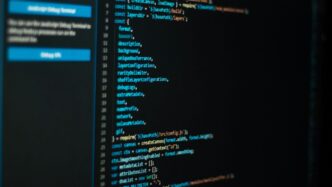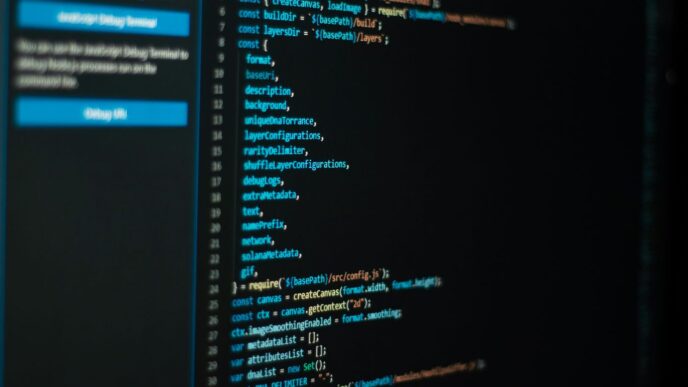So, you’re looking to get better at coding? Maybe you’ve heard about Codewars or maybe you’re just trying to find a good way to practice. It’s a pretty popular spot for coders of all levels, from folks just starting out to those who’ve been at it for years. Think of it like a training ground where you can really test your skills. We’ll walk through some tips to help you make the most of it, whether you’re trying to learn a new language or just want to sharpen your existing abilities.
Key Takeaways
- Codewars uses a martial arts theme to motivate coders, offering challenges called ‘kata’ to help users improve their skills and earn ranks.
- You can use Codewars to get better at languages you know, or to learn new ones by solving problems in different programming languages.
- Solving coding challenges on Codewars helps build self-confidence by pushing you to your limits and showing you what you can achieve.
- Engaging with the Codewars community by comparing solutions and creating your own kata offers new perspectives and learning opportunities.
- To get the most out of Codewars, understand the difficulty levels of kata, use feedback from others, and keep track of your progress and rank.
Understanding the Codewars Philosophy

Codewars isn’t just another place to solve coding problems; it’s built around a specific way of thinking about learning and improvement. It’s like a martial arts dojo for programmers. You start at a lower rank, and by completing challenges, called ‘kata’, you move up. This whole system is designed to help you get better at coding.
Mastery Through Challenge
The core idea is that real skill comes from facing problems that are a bit tough for you. Codewars has a huge collection of these kata, created by the community itself. Each one is meant to help you practice different coding skills. You can get really good at a language you already know, or you can use it to learn a new one. The site supports over 55 programming languages, so there’s a lot to explore. The goal is to keep pushing yourself with these challenges to reach a higher level of skill.
The Martial Arts Theme
This theme is more than just a bit of fun. It’s about the journey of learning. In martial arts, you earn belts and ranks as you progress. Codewars does the same with its ranking system. As you solve harder kata, you earn honor and move up in rank. This gives you a clear way to see your progress and stay motivated. It’s a way to build your confidence and show yourself what you can do as a programmer.
Community-Driven Learning
What makes Codewars really stand out is its community. The people who use Codewars create the kata, solve them, and then share their solutions. After you solve a kata, you can look at how other people solved the same problem. This is a fantastic way to learn new techniques and see different ways to approach a problem. You can even discuss the kata and best practices with others. It’s a collaborative space where everyone helps each other improve. You can find expert guidance and support by visiting hire js coders if you need it.
Leveraging Codewars for Skill Development
Sharpening Coding Skills with Kata
Think of Codewars kata as little puzzles, but for programmers. Each one is designed to make you think about code in a specific way, helping you get better at things like logic, efficiency, or just using a particular language feature correctly. It’s like going to a gym for your brain. You start with simpler exercises, maybe just figuring out how to reverse a string or add up a list of numbers. As you get better, the challenges get tougher, pushing you to use more advanced techniques. This consistent practice is key to building solid coding muscles. It’s a great way to really get a handle on the basics before you move on to bigger projects. You can find a huge variety of these challenges on platforms like Codewars.
Learning New Languages
Ever wanted to try out Python but you’re usually a Java person? Codewars makes that pretty easy. You can solve a challenge in a language you already know, and then immediately try the same one in a language you want to learn. It’s a hands-on way to see how different languages handle the same problem. You’ll start to notice patterns and differences, which really helps things stick. Plus, seeing how other people solve problems in a new language can give you ideas you wouldn’t have thought of yourself.
Gaining New Perspectives
This is where Codewars really shines. After you solve a kata, you get to see how other people solved it. And let me tell you, you’ll see some wild and clever solutions. Some might be super short, others might use techniques you’ve never even heard of. It’s like looking at the same problem from a dozen different angles. This exposure to different approaches is incredibly helpful. You learn new tricks, understand different coding styles, and it can totally change how you think about solving problems in the future. It’s a fantastic way to learn from a whole community of developers without even leaving your chair.
Strategies for Success on Codewars
Getting good at Codewars isn’t just about solving problems; it’s about how you approach them. Think of it like learning a new martial art – you don’t just jump into sparring. You start with the basics, practice forms, and gradually build up your skills. The same applies here. A structured approach will get you further, faster.
Analyze Requirements and Plan Your Approach
Before you even think about typing code, really read the problem. What exactly is it asking for? What are the inputs, and what should the outputs look like? Don’t just skim. Break the problem down into smaller pieces. What are the main steps you need to take? Sometimes, writing down your plan in plain English, or pseudocode, can really help. It’s like drawing a map before you start a road trip. This step alone can save you a lot of headaches later on. For instance, if you’re asked to sort a list, you first need to decide which sorting algorithm makes the most sense for the situation. Understanding the problem thoroughly is key to building a solid foundation.
Implement Incrementally and Test
Once you have a plan, start coding, but don’t try to do it all at once. Write a small piece of your solution, then test it. Does it work as expected? If it does, move on to the next piece. If it doesn’t, fix it before you add more code. This way, you’re not trying to debug a massive chunk of code later. It’s much easier to find a mistake in a few lines than in a hundred. Think about edge cases too – what happens if the input is empty, or very large, or has unusual characters? Testing each part as you go helps catch these issues early.
Review and Optimize Solutions
After you’ve got a working solution, take a step back. Does it do the job? Great! But could it be better? Look at your code. Is it easy to read? Could you make it more efficient? Maybe there’s a simpler way to write a certain part. This is where you can learn a lot by looking at how other people solved the same problem. You might discover clever tricks or more elegant ways to code. Comparing your solution to others is a fantastic way to pick up new techniques and improve your overall coding style. It’s a continuous process of learning and refinement.
Beyond Solving: Engaging with the Codewars Community
Sure, solving kata is the main point of Codewars, but honestly, that’s only half the fun. The real magic happens when you start looking at how other people tackled the same problem. It’s like peeking into the minds of other coders, seeing their unique approaches and picking up new tricks you might never have thought of yourself. Comparing your solution with others after you’ve finished a kata is a fantastic way to learn. You might see a super-efficient algorithm or a clever use of language features that just blows your mind. It really helps you see the different ways a problem can be solved.
Comparing Solutions with Peers
Once you’ve submitted your solution, Codewars lets you see what everyone else came up with. It’s pretty cool. You can see solutions that are way shorter, way faster, or just plain different from yours. It’s a great way to learn new techniques and get new perspectives on coding. I’ve found myself going back to old kata just to see how my understanding has improved and how other people’s solutions have changed too.
Creating Your Own Kata
Feeling like a seasoned pro? Why not create your own kata? It’s a chance to share your knowledge and challenge the community. You can focus on a specific concept you want to teach or a tricky problem you’ve encountered. It’s a rewarding experience to see others learn from something you’ve created. Plus, it’s a good way to solidify your own understanding of a topic. You can find inspiration for your own kata by looking at what problems are popular or what skills are in demand. Creating kata can be a great way to contribute back to the community.
Becoming a Mentor
Even if you don’t create kata, you’re already mentoring just by solving and sharing your solutions. Your well-commented, efficient code can help someone else learn. You can also get involved in discussions, offer constructive feedback on other people’s solutions, or even help out in the forums. It’s all part of building a supportive coding environment. Helping others learn is a really satisfying part of the whole process.
Integrating Codewars into Your Learning Journey
Integrating Codewars into your learning journey is a smart move. It’s not just about solving problems; it’s about building confidence and getting better over time. Think of it like training for something, you wouldn’t just show up for the big event, right? You practice.
Building Self-Confidence
Sometimes, you just don’t know if you’re actually getting better at coding. Codewars gives you a way to test yourself. By tackling challenges, you start to see what you can do. Completing a kata, especially a tougher one, gives you a real sense of accomplishment. It’s a tangible way to see your progress, which is a big confidence booster. You push yourself, and you see the results. It’s a pretty straightforward feedback loop.
Balancing Speed and Accuracy
When you’re working on a problem, there’s always that tension between getting it done quickly and making sure it’s done right. Codewars lets you play with that balance. You can try to solve a kata as fast as possible, or you can take your time to write the most efficient, clean code. Seeing how other people solved the same problem after you’ve finished is a great way to learn different approaches. You might find someone wrote a super short solution, or one that handles edge cases you didn’t even think of. It really opens your eyes to different ways of thinking about code.
Setting Time Limits for Practice
To make your practice sessions more effective, try setting time limits. Maybe you give yourself 30 minutes to solve a particular kata. If you don’t solve it, that’s okay. You can then look at other solutions and learn from them. This approach helps you get used to working under a bit of pressure, which can be useful in real-world coding scenarios or interviews. It also prevents you from getting stuck on one problem for too long. Remember, the goal is learning, not just finishing every single problem. You can find some great beginner resources to get started with coding challenges.
Maximizing Your Codewars Experience
So, you’ve been tackling some kata on Codewars, which is great! But how do you really get the most out of it? It’s not just about solving problems; it’s about growing as a coder. Think of it like training in a martial art – you don’t just show up for one class and expect to be a master, right? You need a plan.
Understanding Kata Difficulty Levels
Codewars uses a ranking system, kind of like belt colors in karate, to show how hard a kata is. You’ll see everything from 8 kyu (the easiest) all the way up to 1 kyu, and then the dan ranks for the really tough stuff. It’s smart to start with the easier ones to get a feel for the platform and the types of problems. As you get more comfortable, you can gradually move up. Don’t be afraid to try a kata that seems a bit challenging; sometimes that’s where the best learning happens. Just remember to analyze the problem statement thoroughly before you start coding. It’s easy to jump in, but taking a moment to understand what’s actually being asked can save you a lot of time later. You can find a good overview of how to approach problems on pages about coding exercises.
Utilizing Community Feedback
This is a big one. After you solve a kata, you can see how other people solved it. Seriously, some of the solutions you’ll see are mind-blowing! It’s a fantastic way to learn new tricks, different approaches, and even more efficient ways to write code. Don’t just look at the top-voted solution; check out a few different ones. You might find a style that really clicks with you. People also leave comments, and while not all feedback is gold, a lot of it is really helpful. If someone points out something in your code, try to understand their perspective. It’s all part of the learning process.
Tracking Your Progress and Ranks
Watching your rank go up is pretty satisfying, isn’t it? It’s a clear way to see how you’re improving. Keep an eye on the languages you’re practicing and how your skills are developing across them. You can also see which types of problems you’re excelling at and which ones you might need to work on more. Setting small goals, like reaching a certain rank in a specific language or solving a certain number of kata per week, can keep you motivated. It’s a marathon, not a sprint, so celebrate the small wins along the way!
Keep Coding, Keep Growing
So, that’s a wrap on our look at CodeWars. It’s a pretty neat place to test your skills, learn new tricks from other coders, and just generally get better at what you do. Whether you’re just starting out or you’ve been coding for years, there’s always something new to discover there. Don’t be afraid to try out different languages or tackle those tricky problems. Remember, everyone starts somewhere, and the community is there to help. Keep practicing, keep challenging yourself, and you’ll see yourself improve. Happy coding!
Frequently Asked Questions
What exactly is Codewars?
Codewars is like a training ground for coders! You solve small coding puzzles, called ‘kata,’ in a programming language you like. As you solve more, you get better and earn ranks, kind of like in martial arts. It’s a fun way to learn and improve your coding skills.
What can I do with Codewars?
You can use Codewars to get really good at coding. It helps you practice specific skills, learn new programming languages by solving challenges in them, and see how other skilled coders solve the same problems. It’s also a way to build your confidence and see how much you’re improving.
How do the difficulty levels of kata work?
Think of kata difficulty like levels in a game. There are easier ones for beginners and harder ones for experts. You start with easier ones and work your way up. This helps you learn step-by-step and get better at different coding techniques.
Why should I look at other people’s solutions?
After you solve a kata, Codewars lets you see how other people solved it. This is super helpful because you can learn new tricks and different ways to write code. It’s like getting tips from lots of experienced programmers!
Can I create my own coding challenges on Codewars?
Yes! You can create your own kata to challenge others. This is a great way to share what you’ve learned and test other coders. It also helps you become a more experienced coder yourself.
How often should I practice on Codewars?
It’s a good idea to practice regularly, maybe for a set amount of time each day or week. Trying to solve problems quickly is good, but it’s even more important to make sure your code works correctly. Balancing speed with accuracy helps you become a better coder overall.





